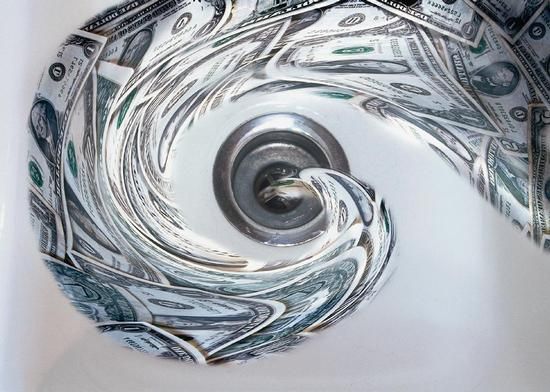We often hear about how the government needs to run its budget just like a household does. It’s an easy analogy to understand, but it’s also completely wrong. But first let’s review some of the MR basics.
First, most of the money in our monetary system is called “inside money” because it is created inside the private sector in the process of loan creation. Loans create deposits and we use those deposits as the primary way to transact in the US economy. Outside money comes from the government because it originates outside the private sector. This includes cash, coins and bank reserves. This form of money facilitates inside money. For instance, bank reserves exist primarily to help private banks settle payments among one another. And cash exists to allow bank account owners (inside money account owners) to transact more conveniently by drawing down their accounts. See here for more on inside money and outside money.
The key to understanding the monetary system is understanding how the stability of the system depends on inside money and the flows out of and into inside money. For instance, when banks issue more loans than their customers can pay back then you get an environment like 2008 where bank runs occur and the government ultimately has to step in to support the private inside money system by providing the flows that fill balance sheet holes. I like to say that the US government has outsourced money creation to the private banks. I won’t argue whether that’s good or bad. It just is what it is.
Now, when the government spends money they don’t just print up dollars and fire them into the economy. Just like the rest of us, the government is a user of inside money (although it’s a very special user of inside money because it can tax and issue risk-free bonds – the government is a contingent issuer of money, ie, contingent upon legal changes). The government obtains inside money either taxing your inside money account and redistributing it to someone else OR they sell a bond, obtain inside money and spend it into someone else’s account. In essence, the government is a massive redistributor of inside money. You could say that the banking system’s best client is the US government. And if that client doesn’t cooperate then things can get dicey.
A budget surplus occurs when the government spends less than they take in in taxes. This means they obtain inside money and don’t redistribute it back into the system. The government is essentially saving inside money in this case. This is very similar to someone drawing down their account in inside money via ATM withdrawals and burying the cash in a hole. The banking system can’t sustain that because the inside money system is dependent on the fact that the loans which created the deposits will eventually be repaid with the same deposits that the loan created in the first place. In other words, the inside money system is dependent on a steady flow of funds to feed its stability. If it doesn’t get this flow of funds then it defaults on itself.
When the banking system’s best customer takes funds from the system and doesn’t feed them back into the system it is a lot like a bank run causing the system to lose a necessary flow of funds that feeds the inside money system and economic stability. That can be sustained for a little while, but only so long as the flow is coming from somewhere else. For instance, a current account surplus nation gets a flow of funds from outside the country. That’s why we see many current account nations run sustained budget surpluses without encountering problems. Countries like the USA, who are chronic current account deficit countries, don’t have that luxury. If the flow doesn’t come from abroad and the flow doesn’t come from the government then the flow must increasingly come from inside the non-bank private sector. That’s also sustainable for a period, but likely to be destabilizing. I don’t think it’s a coincidence that budget surpluses have historically been followed by recessions or depressions (for instance, in 1929 and 1999).
Understanding the monetary system is largely about understanding the quality and quantity of the flows through the system. A government budget surplus often sounds smart, but when we look under the hood at the actual flows, we realize that the answer is much more complex than simply saying that the government should act more like a household. There are times when a budget surplus will likely lead to systemic instability. A budget surplus with a current account deficit is likely to be one of those times.
Mr. Roche is the Founder and Chief Investment Officer of Discipline Funds.Discipline Funds is a low fee financial advisory firm with a focus on helping people be more disciplined with their finances.
He is also the author of Pragmatic Capitalism: What Every Investor Needs to Understand About Money and Finance, Understanding the Modern Monetary System and Understanding Modern Portfolio Construction.



Comments are closed.